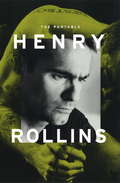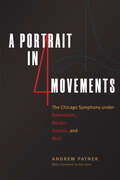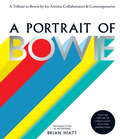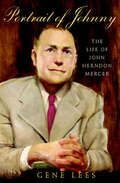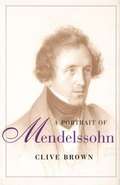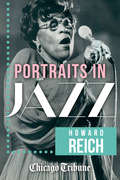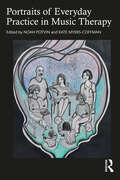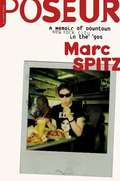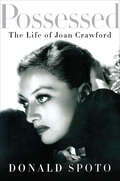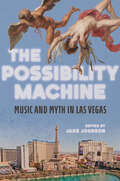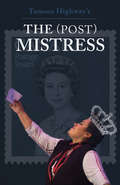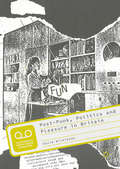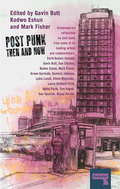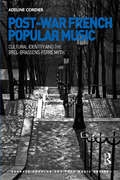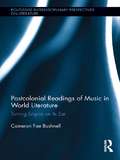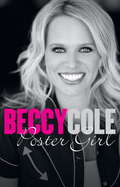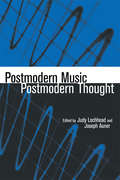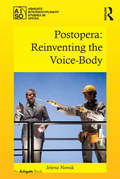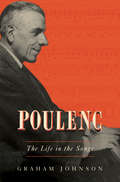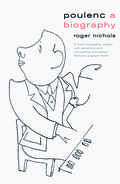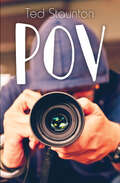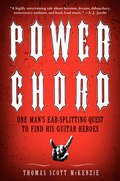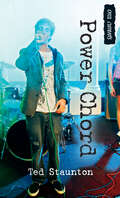- Table View
- List View
The Portable Henry Rollins
by Henry RollinsHenry Rollins is an artist whose legendary, no-holds-barred performances encompasses music, acting, and written and spoken word. As Details magazine said when it named Rollins the 1994 Man of the Year: "through two decades of rage and discipline, Henry Rollins has transformed himself from an L. A. punk rocker into a universal soldier. His enemies: slackers and hypocrites. His mission: to steel your soul and rock your world." Rollins was frontman for the seminal punk band Black Flag, and since 1987 has led the Rollins Band, whose ninth album, Come In and Burn, was just released by DreamWorks. As a spoken-word artist, he regularly performs at colleges and theaters worldwide and has released eight spoken-word audiotapes. His album Get in the Van won the Grammy for Best Spoken Word Album for 1995. As an actor, he has appeared in The Chase, Johnny Mnemonic, Heat, and David Lynch's forthcoming film,Lost Highway. From his days as front man for the band Black Flag and the current Rollins Band to his books and spoken-word audiotapes, Henry Rollins is the music, the attitude, and the voice that takes no prisoners. In his twelve books, he has led us on a hallucinatory journey through the decades--and his mind--with poems, essays, short stories, diary entries, and rants that exist at "the frayed edges where reality ends and imagination begins" (Publishers Weekly). For the first time, the best of his legendary, no-holds-barred writings are available. This collection includes new photos and works from such seminal Rollins books as: High Adventure in the Great Outdoors; Art to Choke Hearts; Bang! Black Coffee Blues; Get in the Van; Do I Come Here Often? Solipsist. Plus never before released stories and more. . .
A Portrait in Four Movements: The Chicago Symphony under Barenboim, Boulez, Haitink, and Muti
by Andrew Patner“Playing in an orchestra in an intelligent way is the best school for democracy.”—Daniel Barenboim The Chicago Symphony Orchestra has been led by a storied group of conductors. And from 1994 to 2015, through the best work of Daniel Barenboim, Pierre Boulez, Bernard Haitink, and Riccardo Muti, Andrew Patner was right there. As music critic for the Chicago Sun-Times and WFMT radio, Patner was able to trace the arc of the CSO’s changing repertories, all while cultivating a deep rapport with its four principal conductors. This book assembles Patner’s reviews of the concerts given by the CSO during this time, as well as transcripts of his remarkable radio interviews with these colossal figures. These pages hold tidbits for the curious, such as Patner’s “driving survey” that playfully ranks the Maestri he knew on a scale of “total comfort” to “fright level five,” and the observation that Muti appears to be a southpaw on the baseball field. Moving easily between registers, they also open revealing windows onto the sometimes difficult pasts that brought these conductors to music in the first place, including Boulez’s and Haitink’s heartbreaking experiences of Nazi occupation in their native countries as children. Throughout, these reviews and interviews are threaded together with insights about the power of music and the techniques behind it—from the conductors’ varied approaches to research, preparing scores, and interacting with other musicians, to how the sound and personality of the orchestra evolved over time, to the ways that we can all learn to listen better and hear more in the music we love. Featuring a foreword by fellow critic Alex Ross on the ethos and humor that informed Patner’s writing, as well as an introduction and extensive historical commentary by musicologist Douglas W. Shadle, this book offers a rich portrait of the musical life of Chicago through the eyes and ears of one of its most beloved critics.
A Portrait of Bowie: A tribute to Bowie by his artistic collaborators and contemporaries
by Brian HiattA strikingly unique tribute to David Bowie, comprising a collection of 40 visual portraits of the icon throughout his career, and text tributes by his artistic collaborators and contemporaries.
A Portrait of Bowie: A tribute to Bowie by his artistic collaborators and contemporaries
by Brian HiattHIS LIFE WAS A WORK OF ARTNow, artists and musicians who worked with David Bowie during his lifetime - or who were his contemporaries - pay tribute to the icon through their own words on what it was like to work in collaboration with a man whose fluid artistic genius repeatedly broke boundaries, right up until his death. Alongside these text tributes are 40 stunning illustrative and photographic portraits of Bowie throughout his career. The contributing artists and photographers include (alphabetically): Edward Bell, Derek Boshier, Anton Corbijn, Kevin Cummins, Chuck Connelly, Chalkie Davies, Stephen Finer, Greg Gorman, Derry Moore, Terry O'Neill, Mick Rock, Masayoshi Sukita, George Underwood, Justin de Villeneuve and more. Alongside these remarkable portraits are insightful, personal written pieces by his contemporaries, and musicians and artists who worked closely with Bowie, including Zachary Alford, Carlos Alomar, Toni Basil, Gail Ann Dorsey, Mike Garson, Dana Gillespie, Debbie Harry and Chris Stein, Cyndi Lauper, and Nile Rodgers, among others. The book is curated by Brian Hiatt, of Rolling Stone magazine, as General Editor.** Newly revised and improved ebook edition, optimized for both small- and large-screen devices **
Portrait of Johnny: The Life of John Herndon Mercer
by Gene LeesAn intimate biography of the great songwriter, this is also a deeply affectionate memoir by one of Johnny Mercer's best friends. "Moon River," "Laura," "Skylark," "That Old Black Magic," "One for My Baby," "Accentuate the Positive," "Satin Doll," "Days of Wine and Roses," "Something's Gotta Give"--the honor roll of Mercer's songs is endless. Both Oscar Hammerstein II and Alan Jay Lerner called him the greatest lyricist in the English language, and he was perhaps the best-loved and certainly the best-known songwriter of his generation. But Mercer was also a complicated and private man. A scion of an important Savannah family that had lost its fortune, he became a successful Hollywood songwriter (his primary partners included Harold Arlen and Jerome Kern), a hit recording artist, and, as co-founder of Capitol Records, a successful businessman, but he remained forever nostalgic for his idealized childhood (with his "huckleberry friend"). A gentleman, a nasty drunk, funny, tender, melancholic, tormented--Mercer was a man immensely talented yet plagued by self-doubt, much admired and loved but never really understood. In music historian and songwriter Gene Lees, Mercer has his perfect biographer, who deals tactfully but directly with Mercer's complicated relationships with his domineering mother; his tormenting wife, Ginger; and Judy Garland, who was the great love of his life. Lees's highly personal examination of Mercer's life is sensitive as only the work of a friend of many years could be to the conflicts in Mercer's nature. And it is filled with insights into Mercer's work that could come only from a fellow lyricist (whose own lyrics were much admired by Mercer). Apoignant, candid, revelatory portrait of Johnny.
A Portrait of Mendelssohn
by Clive BrownClive Brown draws a different picture of Felix Mendelssohn's personality and work.
Portraits in Jazz: 80 Profiles Of Jazz Legends, Renegades And Revolutionaries
by Howard ReichHoward Reich has reported on jazz for the Chicago Tribune for almost four decades, and in this time he has met musicians both celebrated and obscure. From his exclusive interviews with Frank Sinatra, Tony Bennett, Lena Horne, and Ella Fitzgerald, to profiles of the early masters like Louis Armstrong, Duke Ellington, and Billie Holiday, this book illustrates Reich's deep understanding of the performances, recordings, and cultural legacies of these jazz masters.This book, comprising Reich's award-winning Chicago Tribune articles, shows readers his unmatched critical insight and unrivaled access to the diverse range of jazz musicians the world over, including the little-known artists who, while never in the national spotlight, were nonetheless instrumental to the evolution of jazz. Divided thematically, Portraits in Jazz is a journey from the time of jazz music's originators, great singers, and early masters through to its courageous standouts, game changers, and regional influencers from Chicago to Cuba and across the globe.Reich, himself a piano performance major at Northwestern University, says in the introduction that studying theory and history are essential to understanding jazz's inner-workings. But these portraits weren't created as academic theses or history-book lessons. They are on-the-spot, in the heat of the moment questions of its greatest practitioners, articles and essays in the here and now, taking readers one step closer to the meaning of sound.
Portraits of Everyday Practice in Music Therapy
by Noah Potvin Kate Myers-CoffmanPortraits of Everyday Practice in Music Therapy is an edited volume of case studies providing music therapy students and new professionals with critical reflections on everyday clinical practice across a variety of treatment settings, theories, approaches, and cultural contexts. These case studies articulate the important foundational work occurring around clinical breakthroughs to illustrate less of what music therapy could be given extraordinary circumstances and more of what music therapy frequently is given realistic circumstances. Additionally, each author explores the impacts of cultural values, expectations, and roles on clinical contexts through examinations of their sociocultural identities and how they intersected with those with whom they worked. Discussion prompts at the end of chapters help readers engage in similar reflective practices and sustain engagement with introduced concepts and ideas. By providing ecological real-world contexts for practice and culturally reflexive lenses through which to understand how therapeutic processes evolved, music therapy students and professionals can be better prepared for the authenticity and complexity of everyday clinical work.
Poseur: A Memoir of Downtown New York City in the '90s
by Marc SpitzMarc Spitz assumed that if he lived like his literary and rock 'n' roll heroes, he would become a great artist, too. He conveniently overlooked the fact that many of them died young, broke, and miserable. In his candid, wistful, touching, and hilarious memoir, Poseur, the music journalist, playwright, author, and blogger recounts his misspent years as a suburban kid searching for authenticity, dangerous fun, and druggy, downtown glory: first during New York's last era of risk and edge, the pre-gentrification '90s, and finally as a flamboyant and notorious rock writer, partying and posing during the music industry's heady, decadent last gasp.Part profane, confidential tell-all and part sweetly frank coming-of-age tale, this dirty, witty memoir finds Spitz careening through the scene, meeting and sometimes clashing with cultural icons like Courtney Love, Jeff Buckley, Rivers Cuomo of Weezer, Chloë Sevigny, Kim Deal, The Dandy Warhols, Guns N' Roses, Ryan Adams, Paul Rudd, Coldplay, Pavement, Peter Dinklage, Julie Bowen, The Strokes, Trent Reznor, Chuck Klosterman, Interpol, and Franz Ferdinand, as well as meeting heroes like Allen Ginsberg, Shirley Clarke, Joe Strummer, and Morrissey. Along the way he finds literary guru Gordon Lish is a long-lost relative, and erstwhile pal and sensation JT LeRoy is an even bigger poseur.Spitz refuses to give up the romantic ghost until a post-9/11 breakdown and an improbable new love (fellow music writer Lizzy Goodman) finally help him strike the hardest pose of all: his true self.
Positionen.Entwicklungen.Erfahrungen – 10 Jahre Junge Opern Rhein-Ruhr: Dokumentation der Konferenz zum Festival „Auf die Ohren, fertig, los!“
by Christiane Plank-Baldauf Merle FahrholzHören, Sehen, Staunen – in den deutschsprachigen Opernhäusern kann junges Publikum seit über zehn Jahren viel entdecken! Die vorliegende Dokumentation fasst die Ergebnisse der Konferenz „Auf die Ohren, fertig los!“ der Jungen Opern Rhein-Ruhr zusammen und gibt Einblicke in künstlerische Produktionsbedingungen, ästhetische Handschriften, Vermittlungsarbeit, institutionelle Rahmenbedingungen und fokussiert aktuelle Uraufführungen des Kooperationsverbunds. Die Ergebnisse der Konferenz werden zudem in einen übergreifenden Kontext gesellschafts- und kulturpolitischer Entwicklungen im Musiktheater für junges Publikum im deutschsprachigen Raum gestellt.
Possessed: The Life of Joan Crawford
by Donald SpotoJoan Crawford was one of the most incandescent film stars of all time, yet she was also one of the most misunderstood. In this brilliantlyresearched, thoughtful, and intimate biography, bestselling author Donald Spoto goes beyond the popular caricature—the abusive, unstable mother portrayed in her adopted daughter Christina Crawford’s memoir, Mommie Dearest—to give us a three-dimensional portrait of a very human woman, her dazzling career, and her extraordinarily dramatic life and times.Based on new archival information and exclusive interviews, and written with Spoto’s keen eye for detail, Possessed offers a fascinating portrait of a courageous, highly sexed, and ambitious womanwhose strength and drive made her a forerunner in the fledgling film business. From her hardscrabble childhood in Texas to her early days as a dancer in post–World War I New York to her rise to stardom,Spoto traces Crawford’s fifty years of memorable performances in classics like Rain, The Women, Mildred Pierce, and Sudden Fear, which are as startling and vivid today as when they were filmed.In Possessed, Spoto goes behind the myths to examine the rise and fall of the studio system; Crawford’s four marriages; her passionate thirty year, on-and-off-again affair with Clark Gable; her friendships and rivalries with other stars; her powerful desire to become a mother; the truth behind the scathing stories in her daughter Christina’s memoir; and her final years as a widow battling cancer. Spoto explores Crawford’s achievements as an actress, her work with Hollywood’s great directors (Frank Borzage, George Cukor, Otto Preminger) and actors (Henry Fonda, James Stewart, Spencer Tracy, John Barrymore), and later, her role as a highly effective executive on the board of directors of Pepsi-Cola.Illuminating and entertaining, Possessed is the definitive biography of this remarkable woman and true legend of film.
The Possibility Machine: Music and Myth in Las Vegas (Music in American Life)
by Celine Ayala Kirstin Bews Laura Dallman Joanna Dee Das James Deaville Robert Fink Pheaross Graham Jessica A Holmes Maddie House-Tuck Jake Johnson Kelly Kessler Michael Kinney Carlo Lanfossi Jason Leddington Janis McKay Sam Murray Louis Niebur Lynda Paul Arianne Johnson Quinn Michael M Reinhard Laura Risk Cassaundra Rodriguez Arreanna Rostosky Brian F WrightSingular and star-studded writings on America’s neon-lit playground At once a Technicolor wonderland and the embodiment of American mythology, Las Vegas exists at the Ground Zero of a reverence for risk-taking and the transformative power of a winning hand. Jake Johnson edits a collection of short essays and flash ideas that probes how music-making and soundscapes shape the City of Second Chances. Treating topics ranging from Cher to Cirque de Soleil, the contributors delve into how music and musicians factored in the early development of Vegas’s image; the role of local communities of musicians and Strip mainstays in sustaining tensions between belief and disbelief; the ways aging showroom stars provide a sense of timelessness that inoculates visitors against the outside world; the link connecting fantasies of sexual prowess and democracy with the musical values of Liberace and others; considerations of how musicians and establishments gambled with identity and opened the door for audience members to explore Sin City–only versions of themselves; and the echoes and energy generated by the idea of Las Vegas as it travels across the country. Contributors: Celine Ayala, Kirstin Bews, Laura Dallman, Joanna Dee Das, James Deaville, Robert Fink, Pheaross Graham, Jessica A. Holmes, Maddie House-Tuck, Jake Johnson, Kelly Kessler, Michael Kinney, Carlo Lanfossi, Jason Leddington, Janis McKay, Sam Murray, Louis Niebur, Lynda Paul, Arianne Johnson Quinn, Michael M. Reinhard, Laura Risk, Cassaundra Rodriguez, Arreanna Rostosky, and Brian F. Wright
The (Post) Mistress
by Tomson HighwayMarie-Louise Painchaud has worked for thirty-five years as post mistress at the post office in Lovely, a francophone Canadian village where she has come to know every client whose mail she handles. The (Post) Mistress is a rollicking, emotional rollercoaster-ride in the form of a one-woman musical, with elements of jazz, Berlin cabaret, French café music, and Brazilian samba.
Post-Punk, Politics and Pleasure in Britain
by David WilkinsonAs the Sex Pistols were breaking up, Britain was entering a new era. Punk's filth and fury had burned brightly and briefly; soon a new underground offered a more sustained and constructive challenge. As future-focused, independently released singles appeared in the wake of the Sex Pistols, there were high hopes in magazines like NME and the DIY fanzine media spawned by punk. Post-Punk, Politics and Pleasure in Britain explores how post-punk's politics developed into the 1980s. Illustrating that the movement's monochrome gloom was illuminated by residual flickers of countercultural utopianism, it situates post-punk in the ideological crossfire of a key political struggle of the era: a battle over pleasure and freedom between emerging Thatcherism and libertarian, feminist and countercultural movements dating back to the post-war New Left. Case studies on bands including Gang of Four, The Fall and the Slits and labels like Rough Trade move sensitively between close reading, historical context and analysis of who made post-punk and how it was produced and mediated. The book examines, too, how the struggles of post-punk resonate down to the present.
Post-Punk Then and Now
by Mark Fisher Green Gartside Kodwo Eshun Sue Clayton Gavin ButtWhat were the conditions of possibility for art and music-making before the era of neoliberal capitalism? What role did punk play in turning artists to experiment with popular music in the late 1970s and early 1980s? And why does the art and music of these times seem so newly pertinent to our political present, despite the seeming remoteness of its historical moment? Focusing upon the production of post-punk art, film, music, and publishing, this book offers new perspectives on an overlooked period of cultural activity, and probes the lessons that might be learnt from history for artists and musicians working under 21st century conditions of austerity. Contemporary reflections by those who shaped avant-garde and contestatory culture in the UK, US, Brazil and Poland in the 1970s and 1980s. Alongside these are contributions by contemporary artists, curators and scholars that provide critical perspectives on post-punk then, and its generative relation to the aesthetics and politics of cultural production today.
Post-War French Popular Music: Cultural Identity and the Brel-Brassens-Ferré Myth (Ashgate Popular and Folk Music Series)
by Adeline CordierJacques Brel, Georges Brassens and Léo Ferré are three emblematic figures of post-war French popular music who have been constantly associated with each other by the public and the media. They have been described as the epitome of chanson, and of 'Frenchness'. But there is more to the trio than a musical trinity: this new study examines the factors of cultural and national identity that have held together the myth of the trio since its creation. This book identifies the combination of cultural and historical circumstances from which the works of these three singers emerged. It presents an innovative analysis of the correlation between this iconic trio and the evolution of national myths that nurtured the cultural aspirations of post-war French society. It explores the ways in which Brel, Brassens and Ferré embody the myth of the left-wing intellectual and of the authentic 'Gaul' spirit, and it discusses the ambiguous attitude of post-war French society towards gender relations. The book takes an original look at the trio by demonstrating how it illustrates the popular representation of a key issue of French national identity: the paradoxical aspiration to both revolution and the maintenance of the status quo.
Postcolonial Readings of Music in World Literature (Routledge Interdisciplinary Perspectives on Literature)
by Cameron Fae BushnellThis book reads representations of Western music in literary texts to reveal the ways in which artifacts of imperial culture function within contemporary world literature. Bushnell argues that Western music’s conventions for performance, composition, and listening, established during the colonial period, persist in postcolonial thought and practice. Music from the Baroque, Classical, and Romantic periods (Bach through Brahms) coincides with the rise of colonialism, and Western music contains imperial attitudes and values embedded within its conventions, standards, and rules. The book focuses on the culture of classical music as reflected in the worlds of characters and texts and contends that its effects outlast the historical significance of the real composers, pieces, styles, and forms. Through examples by authors such as McEwan, Vikram Seth, Bernard MacLaverty, Chang-rae Lee, and J.M. Coetzee, the book demonstrates how Western music enters narrative as both acts of history and as structures of analogy that suggest subject positions, human relations, and political activity that, in turn, describes a postcolonial condition. The uses to which Western music is put in each literary text reveals how European art music of the seventeenth through the nineteenth centuries is read and misread by postcolonial generations, exposing mostly hidden cultural structures that influence our contemporary understandings of social relations and hierarchies, norms for resolution and for assigning significance, and standards of propriety. The book presents strategies for thinking anew about the persistence of cultural imperialism, reading Western music simultaneously as representative of imperial, cultural dominance and as suggestive of resistant structures, forms, and practices that challenge the imperial hegemony.
Poster Girl
by Beccy ColeBeccy Cole's inspirational memoir from the heart of Australian country music.Beccy Cole has country music in her blood. Daughter of a country music star, Carole Sturtzel, she is one of the most popular country singer-songwriters in Australia today. This is the story of her life - in her own words.At fourteen, Beccy was performing in her mother's group, Wild Oats. By her late teens, Beccy had teamed up with the Dead Ringer Band - Kasey Chambers' family band - and had attracted the attention of the country music world by winning the Star Maker quest: the same award that started the careers of Keith Urban, Lee Kernaghan, James Blundell and Gina Jeffreys. It was just the first of many awards and accolades for this multitalented woman with a big heart.With refreshing candour, Beccy shares her story: leaving everything she knew to pursue her dream, making a name for herself with her own band; her marriage and motherhood; her subsequent divorce, becoming a single mother and maintaining the nurturing love of family. Performing for the Australian troops in Afghanistan. Coming out, and what it has meant for her and her fans. Taking control of her own life - and finding love.Heartfelt and honest, Poster Girl is the inspirational memoir of a strong woman who epitomises the authentic spirit of country music, and of Australia.
Postmodern Music/Postmodern Thought (Studies In Contemporary Music And Culture Ser. #Vol. 4)
by Judy Lochhead Joseph AunerWhat is postmodern music and how does it differ from earlier styles, including modernist music? What roles have electronic technologies and sound production played in defining postmodern music? Has postmodern music blurred the lines between high and popular music? Addressing these and other questions, this ground-breaking collection gathers together for the first time essays on postmodernism and music written primarily by musicologists, covering a wide range of musical styles including concert music, jazz, film music, and popular music. Topics include: the importance of technology and marketing in postmodern music; the appropriation and reworking of Western music by non-Western bands; postmodern characteristics in the music of Górecki, Rochberg, Zorn, and Bolcom, as well as Björk and Wu Tang Clan; issues of music and race in such films as The Bridges of Madison County, Batman, Bullworth, and He Got Game; and comparisons of postmodern architecture to postmodern music. Also includes 20 musical examples.
Postopera: Reinventing The Voice-body (Ashgate Interdisciplinary Studies in Opera)
by Jelena NovakBoth in opera studies and in most operatic works, the singing body is often taken for granted. In Postopera: Reinventing the Voice-Body, Jelena Novak reintroduces an awareness of the physicality of the singing body to opera studies. Arguing that the voice-body relationship itself is a producer of meaning, she furthermore posits this relationship as one of the major driving forces in recent opera. She takes as her focus six contemporary operas - La Belle et la Bête (Philip Glass), Writing to Vermeer (Louis Andriessen, Peter Greenaway), Three Tales (Steve Reich, Beryl Korot), One (Michel van der Aa), Homeland (Laurie Anderson), and La Commedia (Louis Andriessen, Hal Hartley) - which she terms 'postoperas'. These pieces are sites for creative exploration, where the boundaries of the opera world are stretched. Central to this is the impact of new media, a de-synchronization between image and sound, or a redefinition of body-voice-gender relationships. Novak dissects the singing body as a set of rules, protocols, effects, and strategies. That dissection shows how the singing body acts within the world of opera, what interventions it makes, and how it constitutes opera’s meanings.
Poulenc: The Life In The Songs
by Graham JohnsonOne of the greatest modernist composers comes alive in this illuminating biography, a must-have for musicians and music-lovers alike. Francis Poulenc (1899–1963) is widely acknowledged as one of the twentieth century’s most significant masters of vocal music —solo, choral, and operatic— quite apart from his achievements in instrumental spheres. But what it cost him, and the determined bravery it took for his unusual talent to thrive, has always been underestimated. In this seminal biography, which will serve as the definitive guide to the songs, acclaimed collaborative pianist Graham Johnson shows that it is in Poulenc’s extraordinary songs, and seeing how they fit into his life —which included crippling guilt on account of his sexuality— that we discover Poulenc heart and soul. With Jeremy Sams’s vibrant new song translations, the first in over forty years, and the insight that comes from a lifetime of performing this music, Johnson provides an essential volume for singers, pianists, listeners, and readers interested in the artistic milieu of modernism in the first half of the twentieth century.
Poulenc: A Biography
by Roger NicholsAn authoritative account of the life and work of Francis Poulenc, one of the most prolific and striking figures in twentieth-century classical music Francis Poulenc is a key figure in twentieth-century classical music, as well as an unorthodox and striking individual. Roger Nichols draws upon Poulenc's music and other primary sources to write an authoritative life of this great artist. Although associated with five other French composers in what came to be called “Les Six”, Poulenc was very much sui generis in personality and in his music, where he excelled over a wide repertoire—opera, songs, ballet scores, chamber works, piano pieces, sacred and secular choral works, orchestral works and concertos. This book fully covers this wide range, while also describing the vicissitudes of Poulenc's life and the many important relationships he had with major figures such as Satie, Ravel, Stravinsky, Diaghilev, Cocteau and others.
POV (Orca Limelights)
by Ted StauntonWhen first-year film student Spencer O'Toole is asked to make a music video for a band, he leaps at the chance. But Jerry, Spencer's dad, shows up, and somehow the band assumes he's in charge, despite the fact that he has zero background in film. And then there's Scratch, violent gang member turned sleazy music producer, who keeps making big promises but fails to deliver on a single one. Spencer has no idea how he's going to get this thing made. When the band invites him and his dad up to a cottage for the weekend, Spencer takes the opportunity to ditch Jerry. But one small fib snowballs into dozens of lies, and soon Spencer finds himself in way over his head.
Power Chord: One Man's Ear Splitting Quest to Find His Guitar Heroes
by Thomas Scott MckenzieDetermined to track down the legendary guitar heroes of the golden age of heavy metal--men like Ronnie James Dio, Slash, and Ace Frehley of KISS--McKenzie set off on a pilgrimage to come to terms with the instrument that captivates him and music lovers everywhere.
Power Chord: (power Chord) (Orca Currents)
by Ted StauntonAt a Battle of the Bands event, Ace and his best friend Denny notice that girls like musicians, no matter how dorky the dudes might be. Having, so far, been severely challenged when it comes to meeting girls, they decide to start a band. Ace discovers that he loves playing guitar and electric bass. While Denny tweets their every move and their clean-freak drummer, Pig, polishes everything in sight, Ace tries to write a song that will win at the next local teen songwriting contest. It's more difficult than he thought it would be. When Denny brings a great tune to rehearsal, Ace is devastated that Denny, who rarely practices, is a better songwriter than he is. The contest is only days away when Ace discovers that Denny stole the song, and Ace has to decide if winning is worth the lie. Also available in French.
